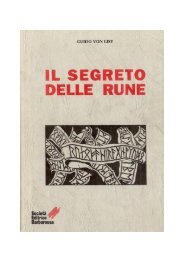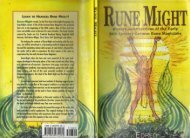Create successful ePaper yourself
Turn your PDF publications into a flip-book with our unique Google optimized e-Paper software.
Rune-Magic, <strong>by</strong> Siegried Adolf Kummer<br />
7/7/11 12:15 AM<br />
reads in translation:<br />
'So I saw the barbarians (in Germania) on the other<br />
side of the Rhine singing passionate tunes with words<br />
which resembled the cry of cackling hens, and (I saw)<br />
their joy in these songs.'<br />
Forgive me, if this translation is incorrect! On the basis of this<br />
passage, stories have always been told about how the singing of<br />
Germanic folk resembled the croaking of birds of prey."<br />
Julian, who himself fought against the Germanic peoples, probably does not<br />
have in mind here the battle song of the Germanic tribes. In this case he<br />
would probably have said: "So I heard," instead of "So I saw." Because of<br />
this latter expression, as well as the emphasis on the joy of the Germanic<br />
people in these melodies described as being passionate, one begins to<br />
suspect that the passage deals with the observation of a legislative Thingassembly<br />
of a Germanic tribe supporting the field commander, then allied<br />
with the Romans. His comparison of the reported manner of song with the<br />
cackling of hens, in spite of the apparently disparaging manner of<br />
expression of a foreign observer, is nonetheless quite vivid, and one can<br />
recognize in this an authentic description of yodeling, when one thinks<br />
about the first part of the stanza, arranged for several voices, with the long<br />
drawn out ending.<br />
Since Julian's Germanic campaign obviously did not concern mountain<br />
people whose customs he was observing, his testimony may therefore<br />
further serve to establish the fact that yodeling as Runic and sacralized song<br />
was the expression of a widespread, common Germanic custom. Its present<br />
occurrence only among the residents of the Alps demonstrates to us the<br />
tenacity of the life-span of ancient Germanic ethnic treasures, which must<br />
be described as spiritual treasures. So, again, it is not difficult to recognize<br />
the manner of the barditus, or battle song, described <strong>by</strong> Tacitus in his<br />
Germania in part as yodeling. He writes:<br />
"Further, they know such songs called barditus; through their utterance they<br />
quicken the spirit of battle, and from the song itself they prophesy the<br />
outcome of the coming engagement. As the song rises out of the ranks, they<br />
arouse fear or foster fear, and the song expresses, as it were, almost the beat<br />
of brave hearts as the joined sound of single voices. Primarily, it is in a raw<br />
tone and almost a muffled din. While singing, they hold their shields in<br />
front of their mouths to allow the sound to swell fuller and stronger through<br />
http://www.american-buddha.com/cult.<strong>rune</strong><strong>magic</strong>.<strong>kummer</strong>.htm<br />
Page 22 of 64




